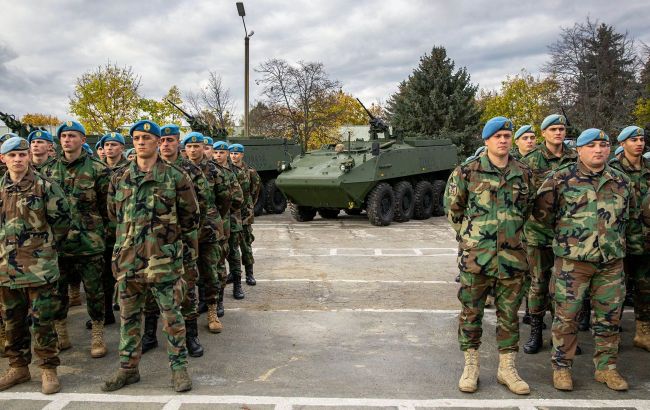Moldova moves to legalize drone interceptions amid rising airspace threats
 Moldova moves to legalize drone interceptions amid rising airspace threats (Getty Images)
Moldova moves to legalize drone interceptions amid rising airspace threats (Getty Images)
Moldova's Ministry of Defense has drafted a new law on the security of national airspace, which the government is set to review at a cabinet meeting on July 2, according to NewsMaker.
According to the publication, the draft legislation was developed by Moldova's Ministry of Defense and has already been published on the government's website. The Cabinet of Ministers is expected to review it during its July 2 session.
The explanatory note states that Moldova is currently facing numerous challenges in managing and securing its airspace.
"In the context of a dynamic geopolitical environment and rapid technological advancements — especially in drones and missiles — protecting the skies has become a top priority," the Ministry of Defense emphasized.
Currently, Moldova's airspace is governed by a 2012 law that "does not account for modern threats and technologies, particularly the use of drones in both civilian and military domains," according to the explanatory note. The existing legislation also lacks clear mechanisms for intercepting aircraft and drones, which hampers the government's ability to respond effectively to such threats.
Threats to Moldova's airspace
The draft law outlines the main threats to Moldova's national airspace, including unauthorized flights by civilian aircraft and drones, violations of airspace regulations, and acts of aerial aggression.
The document also defines the government bodies responsible for ensuring airspace security. Overall leadership is assigned to the Parliament, the President, and the Cabinet, with the Ministry of Defense designated as the central authority.
Additional responsibility falls on the Ministry of Foreign Affairs, the Ministry of Infrastructure, the Intelligence and Security Service, the State Protection and Guard Service, the Customs Service, the Civil Aviation Authority, the state-owned enterprise MOLDATSA, and the National Aviation Security Committee.
Unauthorized flights and airspace violations
Under the proposed law, Moldova will consider flights unauthorized if aircraft operate without permission, with disabled positioning equipment, or within restricted or prohibited zones. However, exceptions will be made in certain situations, such as during natural disasters or low visibility, where such flights may not be deemed unauthorized.
Violations of national airspace rules will include deviations from approved flight paths, failure to meet flight safety requirements, ignoring air traffic controller instructions, or disabling radio communication.
If an aircraft does not follow the controller's orders or has lost communication, it may be intercepted by military aircraft under the direction of the Ministry of Defense. The goal of interception is to establish visual and radio contact, escort the aircraft, redirect its flight path, provide assistance if needed, or force it to exit Moldova's airspace or land. If the aircraft ignores the interceptor's demands, warning fire may be used.
The new law also allows aircraft carrying hazardous materials or objects that could be used in terrorist attacks to enter Moldovan airspace and land at any available airfield. Air traffic controllers are responsible for ensuring flight safety, and such aircraft must be given priority handling.
Aerial aggression
If hostile aircraft, helicopters, drones, or missiles illegally enter Moldova's airspace with aggressive intent, they may be destroyed by air defense systems. Such actions would be taken in accordance with international law and based on an assessment of the actual threat to the population and critical infrastructure.
Interceptor aircraft are authorized to open fire if an aircraft attacks Moldova, takes a tactical position suitable for an attack, or responds aggressively to warning signals.
In the event of armed aggression, a state of war, or a state of siege, the authorities may ban all civilian and state aircraft from flying.
Drones
A separate section of the new law is dedicated to addressing the unauthorized entry of drones into Moldova's airspace. Depending on the nature and level of threat, various measures may be applied — ranging from interception to destruction.
To detect and track drones, authorities will use radar systems, electronic surveillance, and other technologies. Border Police will be granted the authority to intercept or neutralize drones that violate the national border.
Previously, it was reported that Romania's acting president, Ilie Bolojan, expanded the military's powers, allowing the armed forces to shoot down drones that illegally enter the country's airspace.

